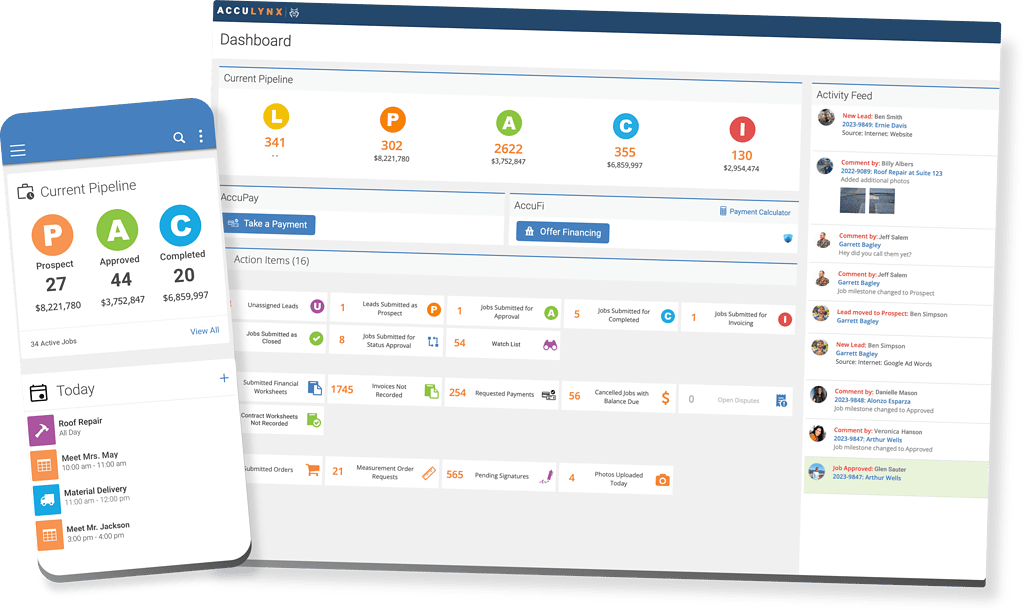According to a report distributed by the Better Business Bureau (BBB), the roofing industry is projected to generate $58.1 billion annually by 2028 due to increased housing investment. If you’re looking to capitalize on this growth by getting into the roofing industry, you’ll need a solid business plan to guide you. By creating a detailed roofing business plan to attract new customers, maximize profits, and provide great service, your roofing company will hit the ground running and stand out from even the most-established businesses.
In this blog, you’ll learn:
- The definition of a business plan
- Why you need a roofing business plan
- What to include in a roofing business plan
- How technology can help your roofing business
The definition of a business plan
A business plan is a formal document that outlines and discusses the objectives, goals, and strategies of a company.
Every business plan should include:
- Executive summary
- Company description
- Market analysis
- Marketing and sales plan
- Info about management and team structures
- Technology needs
- Funding requirements
- Financial projections
Why you need a roofing business plan
Running a residential roofing business can leave you little time for anything else. During your busiest seasons, you’re often focused on helping as many homeowners as you can. When this happens, strategizing for the future tends to get put off until a later date.
But what if your roofing business could do more than just roll with the punches? What if you could make preparations now that solved your current problems, helped to reduce issues down the line, and set you up for long-term success?
When you have a well-crafted roofing business plan, you can navigate difficult times without doubt and stay focused on your goals.
Specifically, a business plan can help with:
- Funding & investors: Show investors, or private equity companies, that you know the roofing industry and have a strategy for success.
- Company focus: Align with your team on objectives, easily track progress, and make informed decisions.
- Sales pipeline: Keep sales flowing with a documented sales & marketing strategy.
- Reporting: Understand who you’re targeting, how you can identify whether your efforts were successful, and where your most profitable jobs actually came from.
When you have a documented vision of what success looks like for each of these categories, you can stay on track and adjust as needed throughout the year.

What to include in a roofing business plan
When it comes to designing and executing a roofing business plan, you’re going to want to include the following:
Executive summary and company description
Summarize the key points of your plan, list your mission statement, and what services you offer. This section should give anyone reading a high-level overview of your business.
The company description, sometimes referred to as the “about us” section, takes a potential customer through your company story and talks about what makes your roofing business unique. Both the executive summary and company description set the foundation for who you are as a company and what type of work you provide.
Opportunities and competitive analysis
When creating a new plan or updating an old one, take the time to look at and monitor competitors on how they’re running their business. As recommended by Forbes, some common but effective strategies are:
- Google Alerts: Setting up a Google Alert for the names of your competitors and common industry terms will give you real-time updates on online activities. This is a quick way to gain insights on competitor services and customer interactions.
- SWOT analysis: Evaluate the strengths, weaknesses, opportunities and threats of competitors so you can understand how they do business and find ways to make your company stand out.
- Reading competitor reviews: Customers tend to leave reviews more often if they’ve had a bad experience. Reading through competitor reviews to see what they’re doing wrong can help you avoid mistakes and find areas of your business that you should focus on.
There are always opportunities within your market, and it’s crucial to dedicate a section of your roofing business plan to identifying them. This information can guide your overall strategies and help you position your business effectively.
Your typical customer
Depending on where you’re located, who you sell to will vary. Before starting your roofing business, research your local area to see:
- Age and family size
- Education and occupation
- Annual income
- Average job cost
- Neighborhood and house size
- Common social media platforms
Understanding what your customers’ lives are like will help you create a service that’s tailored to their needs. In turn, this will help define your customer base and sell more jobs as time goes on. Don’t forget that your demographics can change as your company grows and you should analyze them as you cross milestones.
Marketing and sales strategy
Figure out how you plan to attract customers. In order to be successful, you’ll need to maintain a steady stream of jobs. Your roofing marketing strategy should include:
- Setting up a website
- Posting on social media
- Sending emails
- Running advertisements
- Networking at local and industry events
It may take some trial and error to find what works best for the business but roofing software like AccuLynx can help you easily keep track of leads so you never miss an opportunity. From an initial conversation with a lead, all the way through the signing of a contract, all of your jobs can be tracked in one centralized location so that you and your team can easily view where a job is within the pipeline and how it is progressing.
It’s also easy to track marketing sources and associated spend through reporting within AccuLynx. This will help you keep track of where leads are coming from and identify your ROI from different channels.

Essential team members
Start small and create new roles as the company needs them. Identify who you need to hire right away, such as:
- Office managers
- Sales representatives
- Production managers
- Crews
Finding and training employees will require time and resources. Understanding the cost and outlining timelines for each role will help new hires find success early and often as they grow with your company. It’ll also help establish accountability, as each person will know exactly what they’re responsible for with their daily tasks.
Roofing technology
If you want to compete with larger roofing companies, you’ll need the right technology tools to maximize your time. All-in-one job management software like AccuLynx can help.
AccuLynx is designed specifically for roofing contractors to save time, understand what’s happening, and increase profits. It’s packed with key features like:
- Lead management
- Automated communication
- Proposal, estimate & contract creation
- Production scheduling
- Job costing
- Invoicing & payments
- Reporting & dashboards
Plus, AccuLynx integrates with the tools roofing contractors use everyday like aerial measurement providers, material suppliers, and accounting software.
Budget and expenses
Estimating and creating a detailed budget is essential for financial planning. If you’re spending more than you’re making, you’ll naturally have a hard time keeping your business open.
Your costs will change over time but identifying fixed and variable costs from the start will help you budget for profitability. Predicting your expenses is an important part of crafting a roofing business plan and will help you set realistic pricing margins.
When creating a budget for your roofing business plan, your costs should include:
- Start up: Business registration and license fees, insurance, and any legal or accounting fees
- Equipment: Roofing tools, safety gear, and the cost of regular maintenance on the equipment
- Vehicles: Trucks, fuel, repairs, and insurance
- Labor: Salaries, benefits, taxes, and training or certification costs
- Supplies: Materials, fasteners, the transportation of them, and any waste disposal costs
- Marketing: Website development, digital or social media advertising, and attending events
- Office: Rent, utilities, software, supplies, and any third party services
- Operational: permits, compliance, storage, or payment processing costs
- Margins: How much you hope to make on each job, typically 20-40% for the roofing industry
- Miscellaneous: Anything outside of the main budget, like local sponsorships or community donations
There’s a lot to budget for and new expenses can pop up at any given time. Putting funds aside for expected and unexpected expenses will ensure that you have enough money to cover whatever comes your way.
Funding and financial projections
If you’re looking for a business partner or start-up funds, you’ll need to include information about the capital required to launch and sustain your operations. You can conduct research to provide financial projections–including profit and loss statements, cash flow forecasts, and break-even timelines that show potential investors the financial viability of your business.
This is a strong way to round out your roofing business plan and including all of the sections will help put you on the right track from day one.

How technology can help your roofing business
Your roofing contractor business plan is the backbone of your success. With a strong, clear plan for growing your customer base, increasing your profits, and providing your customers with great service, your roofing business will be well-positioned for years to come–and roofing software like AccuLynx can help simplify and streamline every aspect along the way.
To see how AccuLynx can be an important part of your roofing business plan, schedule a demo today.

